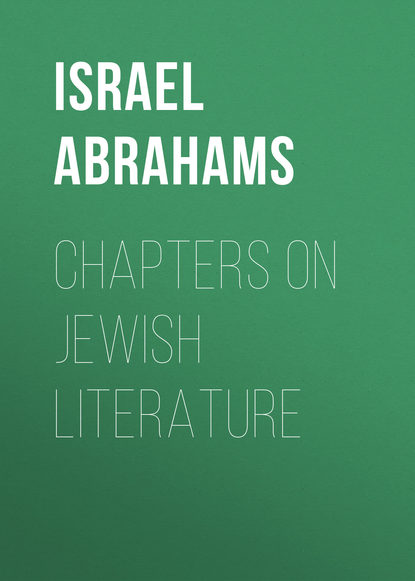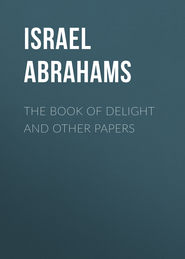По всем вопросам обращайтесь на: info@litportal.ru
(©) 2003-2024.
✖
Chapters on Jewish Literature
Настройки чтения
Размер шрифта
Высота строк
Поля
And their greatness holds my soul in thrall.
Thine the glory is, the power divine,
Thine the majesty, the kingdom thine,
Thou supreme, exalted over all.
* * * * *
Thou art One, the first great cause of all;
Thou art One, and none can penetrate,
Not even the wise in heart, the mystery
Of thy unfathomable Unity;
Thou art One, the infinitely great.
But man can perceive that the power of God makes him great to pardon. If he see it not now, he will hereafter.
Thou art light: pure souls shall thee behold,
Save when mists of evil intervene.
Thou art light, that, in this world concealed,
In the world to come shall be revealed;
In the mount of God it shall be seen.
And so the poet in one of the final hymns of the "Royal Crown," filled with a sense of his own unworthiness, hopefully abandons himself to God:
My God, I know that those who plead
To thee for grace and mercy need
All their good works should go before,
And wait for them at heaven's high door.
But no good deeds have I to bring,
No righteousness for offering.
No service for my Lord and King.
Yet hide not thou thy face from me,
Nor cast me out afar from thee;
But when thou bidd'st my life to cease,
ou lead me forth in peace
Unto the world to come, to dwell
Among thy pious ones, who tell
Thy glories inexhaustible.
There let my portion be with those
Who to eternal life arose;
There purify my heart aright,
In thy light to behold the light.
Raise me from deepest depths to share
Heaven's endless joys of praise and prayer,
That I may evermore declare:
Though thou wast angered, Lord, I will give thanks to thee,
For past is now thy wrath, and thou dost comfort me.
Ibn Gebirol stood a little outside and a good deal above the circle of the Jewish poets who made this era so brilliant. Many of them are now forgotten; they had their day of popularity in Toledo, Cordova, Seville, and Granada, but their poems have not survived.
In the very year of Ibn Gebirol's death Moses Ibn Ezra was born. Of his life little is certain, but it is known that he was still alive in 1138. He is called the "poet of penitence," and a gloomy turn was given to his thought by an unhappy love attachment in his youth. A few stanzas of one of his poems run thus:
Sleepless, upon my bed the hours I number,
And, rising, seek the house of God, while slumber
Lies heavy on men's eyes, and dreams encumber
Their souls in visions of the night.
In sin and folly passed my early years,
Wherefore I am ashamed, and life's arrears
Now strive to pay, the while my tears
Have been my food by day and night.
* * * * *
Short is man's life, and full of care and sorrow,
This way and that he turns some ease to borrow,
Like to a flower he blooms, and on the morrow
Is gone—a vision of the night.
How does the weight of sin my soul oppress,
Because God's law too often I transgress;
I mourn and sigh, with tears of bitterness
My bed I water all the night.
* * * * *
My youth wanes like a shadow that's cast,
Swifter than eagle's wings my years fly fast,
And I remember not my gladness past,
Either by day or yet by night.
Proclaim we then a fast, a holy day,
Make pure our hearts from sin, God's will obey,
And unto him, with humbled spirit pray
Unceasingly, by day and night.
May we yet hear his words: "Thou art my own,
My grace is thine, the shelter of my throne,
For I am thy Redeemer, I alone;
Endure but patiently this night!"
But his hymns, many of which won a permanent place in the prayer-book, are not always sad. Often they are warm with hope, and there is a lilt about them which is almost gay. His chief secular poem, "The Topaz" (Tarshish), is in ten parts, and contains 1210 lines. It is written on an Arabic model: it contains no rhymes, but is metrical, and the same word, with entirely different meanings, occurs at the end of several lines. It needs a good deal of imagination to appreciate Moses Ibn Ezra, and this is perhaps what Charizi meant when he called him "the poet's poet."
Another Ibn Ezra, Abraham, one of the greatest Jews of the Middle Ages, was born in Toledo before 1100. He passed a hard life, but he laughed at his fate. He said of himself:
If I sold shrouds,
No one would die.
If I sold lamps,
Then, in the sky,
The sun, for spite,
Would shine by night.
Thine the glory is, the power divine,
Thine the majesty, the kingdom thine,
Thou supreme, exalted over all.
* * * * *
Thou art One, the first great cause of all;
Thou art One, and none can penetrate,
Not even the wise in heart, the mystery
Of thy unfathomable Unity;
Thou art One, the infinitely great.
But man can perceive that the power of God makes him great to pardon. If he see it not now, he will hereafter.
Thou art light: pure souls shall thee behold,
Save when mists of evil intervene.
Thou art light, that, in this world concealed,
In the world to come shall be revealed;
In the mount of God it shall be seen.
And so the poet in one of the final hymns of the "Royal Crown," filled with a sense of his own unworthiness, hopefully abandons himself to God:
My God, I know that those who plead
To thee for grace and mercy need
All their good works should go before,
And wait for them at heaven's high door.
But no good deeds have I to bring,
No righteousness for offering.
No service for my Lord and King.
Yet hide not thou thy face from me,
Nor cast me out afar from thee;
But when thou bidd'st my life to cease,
ou lead me forth in peace
Unto the world to come, to dwell
Among thy pious ones, who tell
Thy glories inexhaustible.
There let my portion be with those
Who to eternal life arose;
There purify my heart aright,
In thy light to behold the light.
Raise me from deepest depths to share
Heaven's endless joys of praise and prayer,
That I may evermore declare:
Though thou wast angered, Lord, I will give thanks to thee,
For past is now thy wrath, and thou dost comfort me.
Ibn Gebirol stood a little outside and a good deal above the circle of the Jewish poets who made this era so brilliant. Many of them are now forgotten; they had their day of popularity in Toledo, Cordova, Seville, and Granada, but their poems have not survived.
In the very year of Ibn Gebirol's death Moses Ibn Ezra was born. Of his life little is certain, but it is known that he was still alive in 1138. He is called the "poet of penitence," and a gloomy turn was given to his thought by an unhappy love attachment in his youth. A few stanzas of one of his poems run thus:
Sleepless, upon my bed the hours I number,
And, rising, seek the house of God, while slumber
Lies heavy on men's eyes, and dreams encumber
Their souls in visions of the night.
In sin and folly passed my early years,
Wherefore I am ashamed, and life's arrears
Now strive to pay, the while my tears
Have been my food by day and night.
* * * * *
Short is man's life, and full of care and sorrow,
This way and that he turns some ease to borrow,
Like to a flower he blooms, and on the morrow
Is gone—a vision of the night.
How does the weight of sin my soul oppress,
Because God's law too often I transgress;
I mourn and sigh, with tears of bitterness
My bed I water all the night.
* * * * *
My youth wanes like a shadow that's cast,
Swifter than eagle's wings my years fly fast,
And I remember not my gladness past,
Either by day or yet by night.
Proclaim we then a fast, a holy day,
Make pure our hearts from sin, God's will obey,
And unto him, with humbled spirit pray
Unceasingly, by day and night.
May we yet hear his words: "Thou art my own,
My grace is thine, the shelter of my throne,
For I am thy Redeemer, I alone;
Endure but patiently this night!"
But his hymns, many of which won a permanent place in the prayer-book, are not always sad. Often they are warm with hope, and there is a lilt about them which is almost gay. His chief secular poem, "The Topaz" (Tarshish), is in ten parts, and contains 1210 lines. It is written on an Arabic model: it contains no rhymes, but is metrical, and the same word, with entirely different meanings, occurs at the end of several lines. It needs a good deal of imagination to appreciate Moses Ibn Ezra, and this is perhaps what Charizi meant when he called him "the poet's poet."
Another Ibn Ezra, Abraham, one of the greatest Jews of the Middle Ages, was born in Toledo before 1100. He passed a hard life, but he laughed at his fate. He said of himself:
If I sold shrouds,
No one would die.
If I sold lamps,
Then, in the sky,
The sun, for spite,
Would shine by night.







